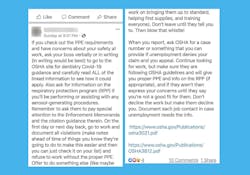The strained clinician relationship: Why dentists and hygienists need to be working together during COVID-19
Relations between dentists and dental hygienists have never been more strained than they are today. Certainly there have always been little nitpicks in our history. Wages rise, profitability decreases. Hygienists want more time. Dentists want more efficiency. These debates have wound through our practices like a river, ebbing and flowing as dentistry changes. For the most part, we dentists have been able to peacefully coexist with dental hygienists. Then COVID-19 happened, and apparently the Grand Canyon opened up between us.
As more and more states proceed with their reopening plans, we are seeing dental hygiene associations weaponize against dentists. According to dental hygiene associations, dental hygienists don’t feel safe performing their jobs. Anecdotally, this is not my experience. After a short meeting with my team, the dental hygienists in my practice were all ready to roll. Once they saw the time and effort put into making the practice safe, I saw excitement in their eyes in anticipation to getting back to providing patient care. Most dentists are probably having the same experience with their dental hygienists. Where the battleground seems to be is dental Facebook groups.
The post in Figure 1 captures this sentiment. It's just one of dozens I've seen.
Posts like this are showing up regularly—tips and tricks on how hygienists can report their dentists to the authorities. I’ve also seen posts with verbiage on how to remain on unemployment and make more money than doing clinical hygiene. In Texas, the Texas Dental Hygiene Association lobbied Governor Greg Abbot’s office to delay dental hygiene opening for weeks. The governor responded with allowing hygiene, just without ultrasonic instrumentation. The infighting continues.
Here is my message for both dentists and hygienists about closing the chasm between us.
For dentists
- Try—really try—to equip your team with the personal protective equipment they need to see patients. If you are having trouble finding something, be up front with them and tell them. They may be able to help with the search for whatever it is you are looking for.
- Give them a little extra time for their procedures. Things are going to run a little slower now than they did before. We need to be understanding.
- Communicate with them. Let them know what challenges we face in the economics of our practices. Many dental hygienists may have not considered what PPO reimbursement is for hygiene visits and done the math on how time and wages affect that. Frankly, many dentists don’t even think about that. I will admit that this crisis is really the first time I put a lot of thought into the profitability of the hygiene department.
For hygienists
- Communicate with your dentist about what your concerns are. Talk through them while being open and honest. Many of us dentists have been seeing emergencies for the last couple of weeks and are now pretty comfortable with the new normal. Help us understand what you’re worried about and how we can help.
- Find ways to help your dentist. We know this has been stressful for dental hygienists, but as dentists and practice owners, we are facing a lot of stress and uncertainty. Many of us are taking loans out to be able to make payroll. Some of that loan may be forgiven by the government, but there is a decent chance it won’t be. There is no such thing as free money from the government. Any help you can give us would be appreciated. That may mean doing things around the office other than hygiene. It might mean helping with touch-up painting. Or deep cleaning drawers, cabinets, storage areas. We understand that these things may not be explicitly listed on your job description, but for many of us, it's an all-hands-on-deck situation.
- Please do not "whistle blow" or file a complaint against your dentist without having voiced your concerns to them first. If even after your objection your dentist is asking you to do 20 prophies a day with only a garbage bag and a pair of old paisley oven mitts, obviously blow that whistle. Presuming things aren’t that bad in your office, if you have a concern or complaint, please voice it with your dentist first. Tell them what concerns you have and why. This is a much more reasonable course of action than being an undercover spy, noting every little infraction like the Facebook post above encourages.
Now more than ever
The COVID-19 pandemic has pushed dentistry into a new era, and now more and ever dentists and hygienist need to be working together. Just remember that in the patient's eyes there are no "sides"—and this virus, like every other virus, doesn't discriminate. So before we rip apart our practices any more than what circumstances have already done, let's buckle down and start to stitch things back together.
Joshua Austin, DDS, MAGD, writes the Pearls for Your Practice column in Dental Economics. After graduating from the University of Texas Health Science Center Dental School, Dr. Austin associated for several years. In October of 2009, he opened a solo general practice in a suburban area of San Antonio, Texas. Dr. Austin is involved in all levels of organized dentistry and can be reached at [email protected].
Related
Editor's note: This article first appeared in the Morning Briefing, a daily newsletter published by Dental Economics, DentistryIQ, Perio-Implant Advisory, and RDH. Learn more and subscribe here.
For full coverage of the coronavirus pandemic, visit the DentistryIQ COVID-19 Resource Center.
About the Author

Joshua Austin, DDS, MAGD
Joshua Austin, DDS, MAGD, writes the Pearls for Your Practice column in Dental Economics. After graduating from the University of Texas Health Science Center Dental School, Dr. Austin associated for several years. In October 2009, he opened a solo general practice in a suburban area of San Antonio, Texas. Dr. Austin is involved in all levels of organized dentistry and can be reached at [email protected].

